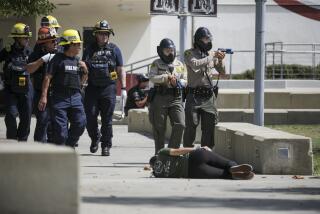Wilson Signs Bills on Firearms Use : Government: Parents will be liable for shootings committed after weapons are left in reach of children.
- Share via
SACRAMENTO — Gov. Pete Wilson signed a package of gun bills Sunday, including a measure holding parents or other adult gun owners criminally liable for shootings committed by children with access to loaded firearms.
Also, he signed bills granting assault weapon owners a second chance to register their firearms and requiring novice handgun purchasers to first receive safety instruction.
Wading deeper into about 400 bills that must be acted upon before midnight tonight, the governor also signed bills designed to remove what he called “unnecessarily complicated” restrictions in certain “right-to-die” situations and to require students in junior and senior high schools to receive instruction in the prevention of AIDS.
Under the bill sponsored by Assemblyman Lloyd G. Connelly (D-Sacramento), it will be against the law starting Jan. 1 for an adult to leave a loaded gun within easy reach of a child who kills or seriously injures someone with it. For a fatal shooting, the owner can face a maximum of three years in prison.
The National Rifle Assn. and Handgun Control Inc., two longstanding adversaries, agreed on the bill, aimed at making adults more responsible about safely storing guns where children cannot get at them.
But the groups were on opposite sides in the debate over the assault gun bill. In signing it, Wilson joined with Republican Atty. Gen. Dan Lungren and Senate President Pro Tem David A. Roberti (D-Los Angeles) in granting an additional 90 days for owners of legally acquired paramilitary weapons to register them.
The landmark 1989 assault gun law prohibited about 60 military-style semiautomatic firearms, but allowed owners of such weapons to keep them if they were registered by last Dec. 31. Although they faced criminal penalties for failure to register, thousands of gun owners did not record their assault weapons.
At first, some of the guns on the prohibited list were misidentified and others did not exist. So Lungren proposed an unprecedented additional 90-day registration period to start next year and attempted to correct the flawed list. Without revisions, he said, the law cannot be enforced by police.
However, gun owner organizations, including the NRA and the Corona-based California Organization for Public Safety, charged that Lungren’s bill added guns to the list and put in jeopardy law-abiding owners of guns that had not been banned. The bill also would have the effect of outlawing some common sporting arms, they said.
T.J. Johnston, chairman of Anaheim-based Gun Owners Action Committee, criticized the bills as unnecessary and ineffective.
“Once again, we see government is putting their fingers in our private lives,” he said. “It’s the ongoing process of disarming the American public. They’re punishing gun owners instead of criminals.”
Lungren and Roberti disputed the claims. Wilson agreed, asserting Sunday that “without the bill, law-abiding citizens who own firearms will remain in limbo and current law will remain impossible to implement.”
As for the firearms safety courses, the governor said instruction for most first-time purchasers of pistols and revolvers will help protect children, at least 89 of whom were shot accidentally in California last year.
He noted that sportsmen long have received firearms safety instruction before being licensed to hunt and said it made “only common sense that a similar course be required before purchasing a handgun.”
The new law will take effect in 1993 and will require prospective handgun purchasers to take a two- to four-hour course developed by the state Department of Justice. However, under the legislation by Assemblyman Rusty Areias (D-Los Banos), proficiency in the safe handling of guns will not be required and if an applicant flunks the test three times, he or she will be granted a certificate anyway.
People exempted from taking the instruction, which will cost about $20, include active and retired members of the military, peace officers, licensed hunters, security guards and private investigators.
In signing the “right-to-die” bill by Sen. Barry Keene (D-Benicia), Wilson said that government should not be “the cause of undue hardship on families already struggling with painful decisions.”
In 1976, California enacted the “Natural Death Act” which, basically, gave terminally ill people the authority to order the removal of their life-support systems. A key provision of the Keene bill will enable a person in advance of illness to make a similar directive if the individual is ever determined to be “permanently unconscious.”
Wilson also signed legislation by Assemblywoman Teresa Hughes (D-Los Angeles) requiring school children in grades seven through 12 to receive instruction in the prevention of AIDS, unless their parents object.
Now, local schools are not compelled to provide AIDS education, although many include it as part of sex education and health classes.
More to Read
Get the L.A. Times Politics newsletter
Deeply reported insights into legislation, politics and policy from Sacramento, Washington and beyond. In your inbox twice per week.
You may occasionally receive promotional content from the Los Angeles Times.








